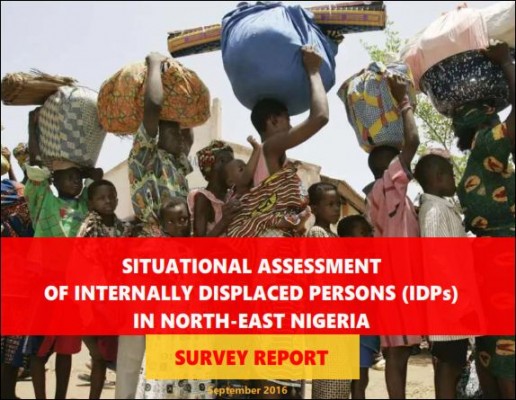Groundbreaking Workshop on AI and Technology-Facilitated Gender-Based Violence at AWiM24
Trending
Sunday May 25, 2025
Trending

ABUJA – In September 2016, a study on Internally Displaced Persons (IDPs) conducted in Nigeria by NOI Polls reported that access to food, water, medicines and relief materials remain big issues to most IDPs; and sadly, women are mostly at the receiving end.
About 85 percent of the IDPs interviewed, at the time, said they did not have access to food, and of the 15 percent that had little access, most of them simply described the quality of food as poor. Similarly, almost 80 percent of IDPs described access to clean water and access to health care services in the camps as very poor.
The report titled “Situational assessment of internally displaced persons in North-East Nigeria” also identified infringement on human rights, discrimination and sexual abuse as some of the crimes perpetrated against women in IDP camps. In particular, the report was the first study to beam the searchlight on the issue of “sex for food” and “sex for gate-pass” for female IDPs who needed to leave the camps in search for food.
The abuse was mainly perpetrated by camp officials, soldiers or members of the civilian joint task force (CJTF) urged with the responsibility of looking after the IDPs. According to the Director of a local non-profit organization based in Maiduguri, “these camp officials are not helping matters. In Dalori, there was a case of a CJTF that kept 2 girls in two different camps, Dalori 1 and 2… He was just exploiting them sexually… even the military and police are involved.”
In May 2018, almost 2 years after, another study by Amnesty International (AI) reported the exact same findings, re-affirming the earlier findings from the report by NOI Polls. The report by AI revealed how Nigerian Military and CJTF members claiming to rescue starving women have separated them from their husbands and confined them in remote satellite camps where they have been raped, sometimes in exchange for food.
According to Osai Ojigho, Director of Amnesty International Nigeria, “It is absolutely shocking that people who had already suffered so much under Boko Haram have been condemned to further horrendous abuse by the Nigerian military… Instead of receiving protection from the authorities, women and girls have been forced to succumb to rape in order to avoid starvation or hunger.”
So many questions can be asked: Why has this problem remained unabated in IDP camps? Have there been any arrests and court hearings for these offences? Are the authorities really committed to addressing these issues of human rights abuses? What can be done to forestall a reoccurrence of this?
The answers are not far-fetched, as it appears authorities from both the Federal and the state governments have not been keen on addressing the issues. It was only very recently that the Nigerian Senate pledged to investigate the reports of alleged sexual abuse of women at IDP camps in the North-East and other parts of the country. Responding to the report by AI, President of Nigerian Senate, Dr. Bukola Saraki said “we must be able to accept where these issues exist and work with partners like yourselves to be able to establish the facts.”
But must the authorities wait until international organizations like Amnesty International (AI), Human Rights Watch (HRW) and World Food Programme (WFP) report these abuses before they wake up to act or set up investigative panels?
It appears there are trust issues associated with the uptake of research reports and studies conducted by indigenous research institutions and organizations. These reports of sexual abuse could have been nipped at the bud had government taken the findings from the initial study seriously.
This attitude needs to change if Nigeria is going to take advantage of its local capacities and human resources to investigate social problems in order to provide home-grown solutions to solving home-grown issues. It is also important for the government to promote the use of local researchers in order to stimulate local narratives to the challenges facing the nation.
Finally, with reports of some IDPs in the North-East returning back to their communities and reintegrating into the society, there’s need for more research and monitoring to ensure that the rights of citizens remain protected, particularly those of women and children. Women play ever-increasing roles in keeping the home and fostering the children, especially from the early years into adulthood
Dr. Bell Ihua is a Nigerian social research and public opinion polling expert. He’s currently Chief Executive Officer at NOI Polls and writes from Abuja, Nigeria.
We’re not gonna spam. We’ll try at least.

Copyright 2020. African Women In Media
Copyright 2020. African Women In Media
Recent Comments